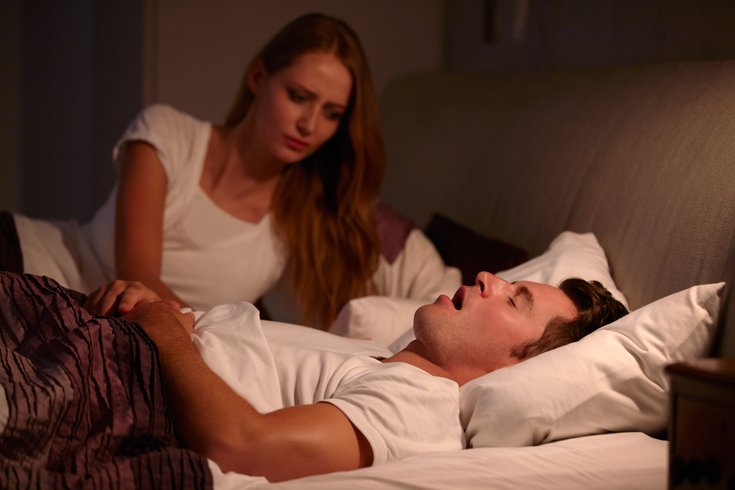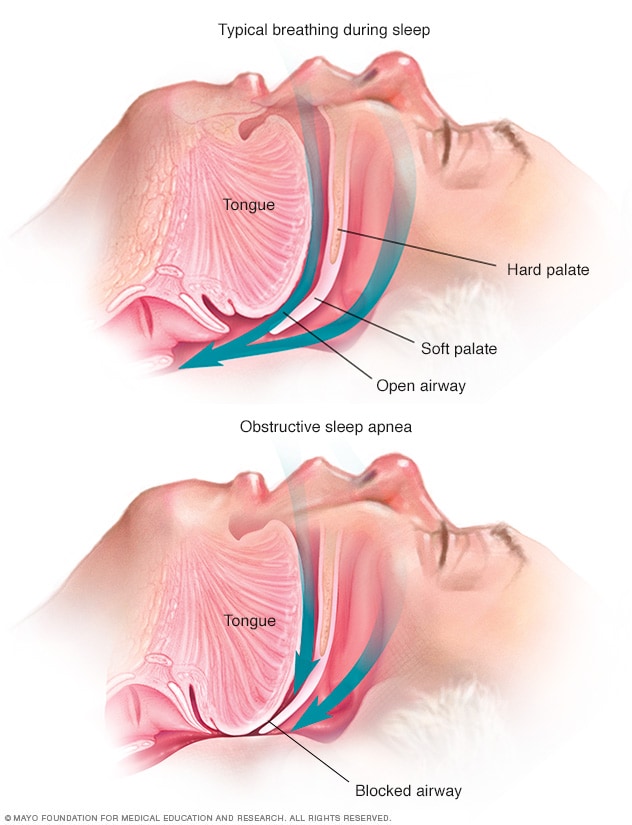Snoring Awareness
"Snoring is very much associated with sleep apnea. But not everybody with sleep apnea snores -- even though the vast majority do -- and not everybody who snores has sleep apnea.""[Customized mouthpiece or mouthguards pull the jaw and tongue slightly forward; basic versions can be ordered online, but they] tend to have a higher association with tooth movement and jaw pain.""It's something that really should be made custom to your mouth [by a dentist].""[Surgery is generally] considered a last resort, because it's painful."David Schwartz, president, American Academy of Dental Sleep Medicine"We see severe patients all the time, and they have no clue they have sleep apnea.""They're only coming in because their bed partner told them to."Kent Smith, founding director, Sleep Dallas, president, American Sleep and Breathing Academy
 |
| Even in the absence of obstructive sleep apnea, snoring can still disrupt people's sleep enough to cause sleep deprivation. Not getting enough sleep each night is associated with an increased risk for type 2 diabetes, obesity, high blood pressure and heart disease. Tero Vesalainen/istock.com |
When something blocks flow of air through the mouth and nose, snoring occurs, as a common condition. As the air struggles to push through, soft tissues vibrate. Sometimes a nasal obstruction, deviated septum or collapsed nasal valve causes people to snore. The sound can also be caused by the tongue. But snoring can also be a symptom of obstructive sleep apnea (OSA), a condition that affects roughly one in five people.
When we sleep, throat muscles relax, blocking the airway. Sleep apnea-caused snoring is frequently loud, and could be followed by shallow breaths, gasping or general restlessness. Other, less-serious conditions can cause snoring; nasal polyps, crooked septum, shape of one's palate or tongue, a cold or allergies. Alcohol consumption, pregnancy or obesity can also contribute to snoring.
When snoring is caused on occasion as a result of having a cold, or imbibing alcohol prior to bedtime, it is generally harmless. Constant snoring might be a good reason to have an appointment with a sleep specialist since research indicates that some 90 percent of people with sleep apnea remain undiagnosed, a condition that can have serious ramifications, including elevated risk of heart problems.
Snoring might pose a risk to health, even in the absence of obstructive sleep apnea. OSA, according to some research, may be associated with cardio-metabolic risk factors like atherosclerosis (artery disease) and endothelial dysfunction (non-obstructive coronary artery disease). People who snored but did not have sleep apnea were examined in a study published in the journal Laryngoscope where researchers found the longer a person snores nightly, the greater the narrowing he/she has in their neck arteries, which has the potential of increasing stroke risk.
Should a sleep study -- where a sleep specialist conducts a study where brain levels, oxygen level, heart rate, eye and leg movements are recorded -- reveal OSA, patients are usually treated with breathing devices -- for example, a continuous positive airway pressure machine, which blasts a steady stream of air into the nose and mouth during sleeping hours.
To prevent snoring not caused by sleep apnea, it helps to lose weight; snoring accompanies weight gain. Even the tongue can gain weight to crowd the airway. "So, weight loss will improve your snoring", explains Steven Holfinger, sleep medicine specialist at Ohio State University's Wexner Medical Center. Men who lost over six pounds greatly reduced their snoring level, while shedding 15 pounds, eliminated it.
"Smoking creates a sticky airway", which hampers air from flowing in an optimal manner, which in turn leads to snoring, explained Dr.Smith. Alcohol prior to bedtime causes muscles adjacent the airway to relax, increasing the chances that snoring will ensue, explained Dr.Holfinger, so it makes sense to stop drinking a few hours before turning in to sleep. And when you sleep, adjust sleeping position; optimally not to sleep on your back to avoid tissues in your upper airways drooping, so "you have a much greater chance of snoring", said Dr.Schwartz.
Doctors recommend some therapies such as nasal strips or dilators; the strips are applied to the outside of the nose at bedtime to help open nasal passages, reducing snoring. An older study found dilators to effectively reduce intensity of snoring in a majority of instances, if the snorer is absent a condition such as OSA. Customized mouthpieces (mouth guard) pull the jaw and tongue slightly forward to open the upper airway. Laser assisted uvulopalatoplasty (LAUP), involves shortening soft tissue dangling back of the throat, with small cuts in the soft palate.
Labels: Obesity, Research, Sleep Apnea, Smoking, Snoring
 Snoring might pose a risk to health, even in the absence of obstructive sleep apnea. OSA, according to some research, may be associated with cardio-metabolic risk factors like atherosclerosis (artery disease) and endothelial dysfunction (non-obstructive coronary artery disease). People who snored but did not have sleep apnea were examined in a study published in the journal
Snoring might pose a risk to health, even in the absence of obstructive sleep apnea. OSA, according to some research, may be associated with cardio-metabolic risk factors like atherosclerosis (artery disease) and endothelial dysfunction (non-obstructive coronary artery disease). People who snored but did not have sleep apnea were examined in a study published in the journal 
0 Comments:
Post a Comment
<< Home